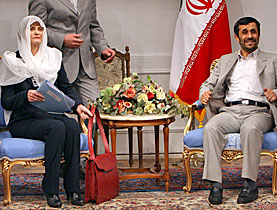
Israel deplores Swiss gas deal with Iran

Reaction – in political and media circles – has been strong in Israel over a Swiss-Iranian natural gas purchase agreement.
The deal, between a private Swiss energy company and Tehran, was signed in the Iranian capital earlier this week in the presence of the Swiss foreign minister, Micheline Calmy-Rey.
The Israeli reaction comes just days after the United States criticised the gas deal.
Israel’s foreign ministry said it had summoned Swiss ambassador Walter Haffner on Wednesday to deplore Calmy-Rey’s trip to Iran, calling it “an act that is unfriendly to Israel”.
Iran has questioned the Holocaust and has in the past called for Israel to be “wiped off the map”.
Given the recent United Nations Security Council sanctions against Iran over its alleged nuclear programme, “now is not the proper time to pursue economic deals” with Tehran, the statement added.
Calmy-Rey has said that the natural gas accord breaches neither UN nor US sanctions. She also said it was unacceptable for the Iranian leadership to deny Israel the right to exist.
During her visit, Calmy-Rey called on Tehran to cooperate with the International Atomic Energy Agency to resolve the long-standing dispute over its nuclear policy.
Iran has denied that its atomic programme is for military ends.
Switzerland has said it favours a diplomatic solution.
Media reaction
The Israeli press on Thursday was also highly critical of the gas deal. “This Swiss decision comes at the worst moment,” said the tabloid Yediot Aharonot.
Quoting diplomatic sources, it said that Switzerland tended to “always adopt an original position” to show its independence from other western countries.
For her part, Calmy-Rey had “the gift of exasperating” the Israeli authorities, wrote the Maariv, another tabloid.
The daily newspaper Haaretz quoted a senior official in the Israeli foreign ministry as saying Switzerland was “sending the wrong message”. He reportedly asked whether Switzerland was ready to “sell its principles”.
On Monday, the US embassy in Bern criticised the gas deal, saying it “sends the wrong message to Iran at a moment when Iran continues to defy United Nations Security Council resolutions” on the country’s nuclear programme.
The US embassy added that the accord “violated the spirit of the sanctions”.
Switzerland uses its good offices to represent US interests in Iran and Iranian interests in Washington. The US and Iran broke off diplomatic relations in 1980.
The Swiss government maintains it informed Washington in advance of the signing of the contract and of the strategic importance of the deliveries.

More
Good offices
Gas deal
The deal with National Iranian Gas Export Company (NIGEC) and EGL covers the delivery to Europe through a pipeline of 5.5 billion cubic metres of gas per year by 2012. The contract runs over 25 years, according to EGL, which declined to reveal the worth of the contract.
Calmy-Rey said it was Switzerland’s strategy to diversify its sources of energy supplies. “We decrease our dependence, and the dependence of Europe, on Russian gas,” she said.
But the move has also come in for criticism within Switzerland. The Swiss Federation of Jewish Communities said earlier this week that it was very disappointed by the deal and that it sent out the wrong signals.
Some politicians and members of the media also raised concerns, with a further contentious issue being Calmy-Rey’s televised meeting with Iranian president Mahmoud Ahmadinejad on Monday, when she appeared wearing a headscarf.
swissinfo with agencies
Persia – as Iran was then known – opened an embassy in Bern in 1917.
In 1919 Switzerland opened a consulate general in Tehran.
In 2005 there were 187 Swiss citizens living in Iran.
At the end of 2004, 3,801 Iranians were living in Switzerland.
During her one-day trip to Tehran, Calmy-Rey also broached human rights in talks with her Iranian counterpart Manoucher Mottaki.
She said she criticised the increasing use of the death penalty and corporal punishment in Iran.
Calmy-Rey said her visit to Tehran helped maintain human rights dialogue which was formalised five years ago.
She told a news conference in Bern that “being a neutral country does not mean being indifferent to human rights violations.”

In compliance with the JTI standards
More: SWI swissinfo.ch certified by the Journalism Trust Initiative



























You can find an overview of ongoing debates with our journalists here . Please join us!
If you want to start a conversation about a topic raised in this article or want to report factual errors, email us at english@swissinfo.ch.